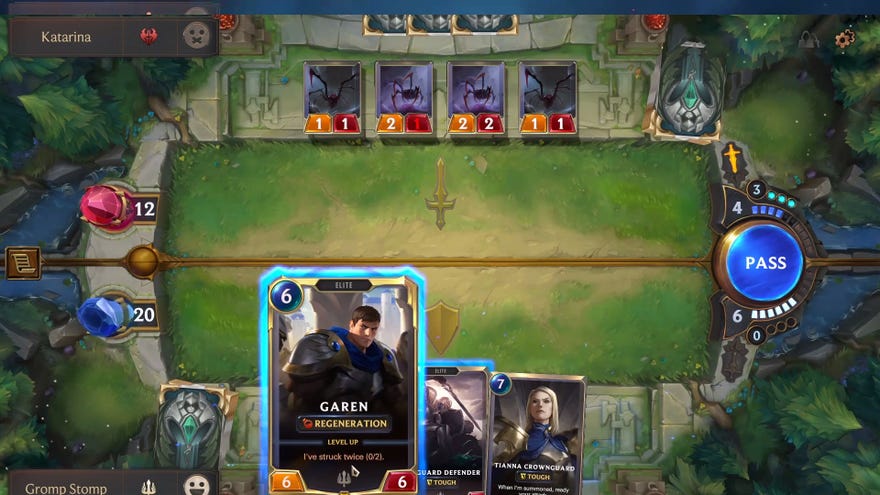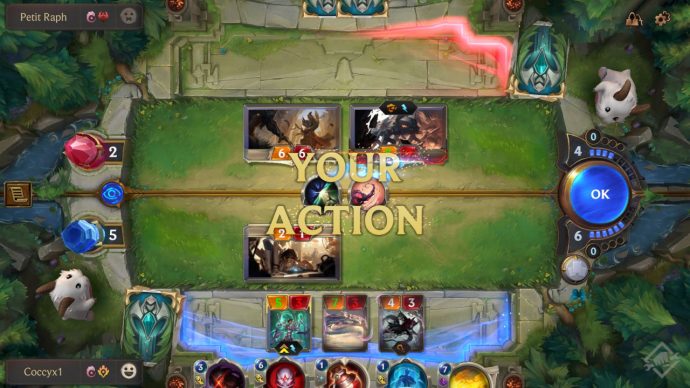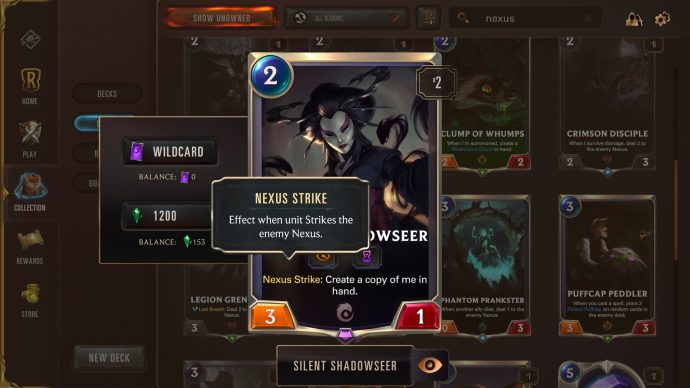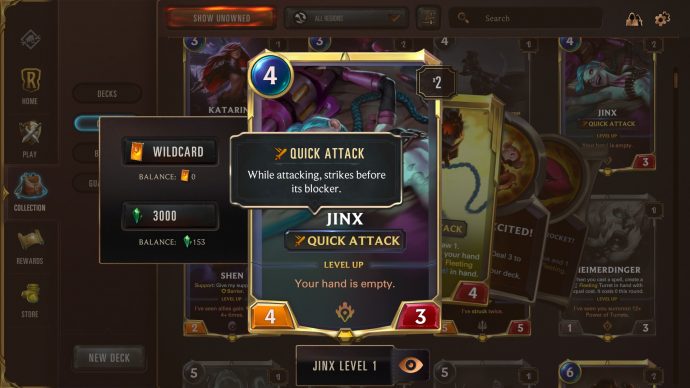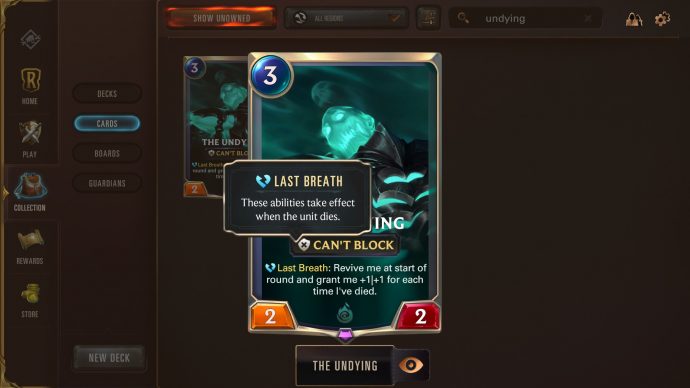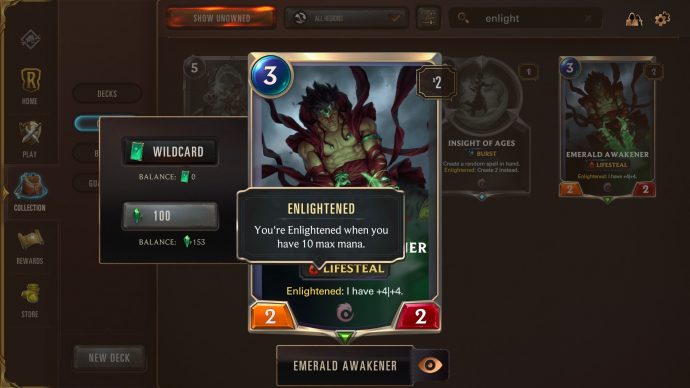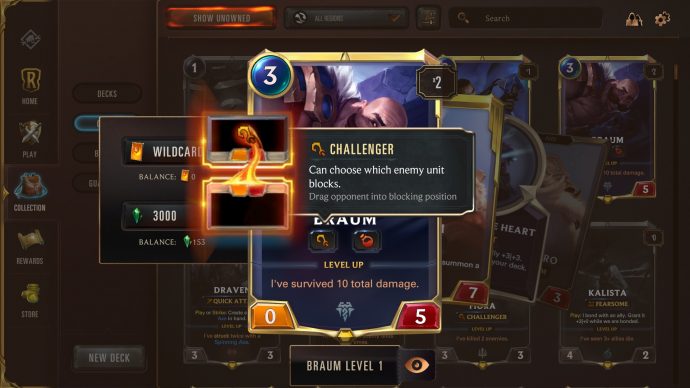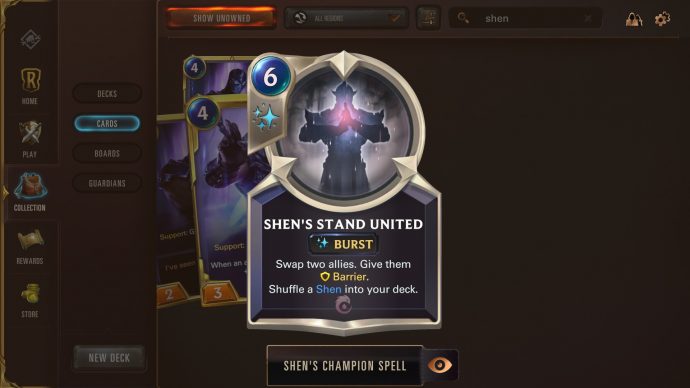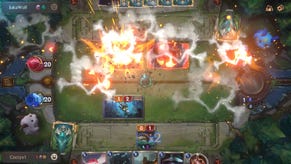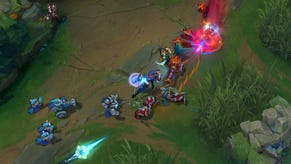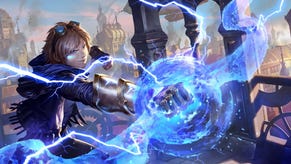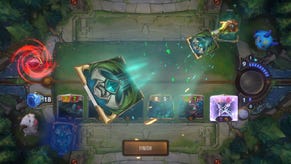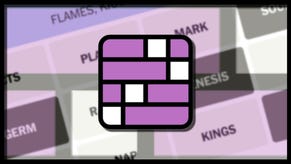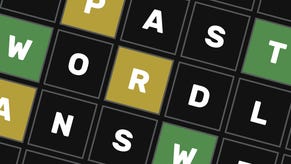Runeterra keywords guide: definitions of all the abilities
Keyword interactions explained
Legends of Runeterra has a lot of skills and abilities hidden on each of their cards via the use of keywords. They range from being able to prevent damage to a unit, to ensuring an enemy can't block your attackers. With so many keywords though, there are some interactions that are not obvious to those who haven't played much of the game, with the consequence being that you could lose the game due to a misunderstanding of what an ability does.
Legends of Runeterra keywords guide
Keywords in Runeterra are single word terms that appear on cards. Some indicate the speed at which a spell is cast, while others grant that unit an ability to use in battle, or when an ability is triggered. Our Runeterra keywords guide will go over all of them, including the new ones introduced during the full game release, explaining what they do and detail any interesting interactions that you should be aware of.
They appear on lots of cards in Runeterra and they can make all the difference in Runeterra best decks. They can also help with making informed choices during the drafting phase of crafting Runeterra Expeditions decks.
Runeterra keywords guide contents
- New Runeterra keywords
- Strike and Nexus Strike
- How Overwhelm interacts with Barrier and Tough
- Quick Attack and Double Attack
- Recalling and Reviving
- How Last Breath interacts with Capture and Obliterate
- Frostbite and Buff spells
- Fearsome
- When is a player Enlightened?
- The difference between Drain and Lifesteal
- Challenger and Elusive
- Shen's swap ability
- Commander Ledros
- Other Runeterra keywords
New Runeterra keywords
With the full release of Runeterra comes six new keywords. Some are associated with regions that were seen as a little underpowered, while others are for the new region of Bilgewater that was introduced as the game came out of open beta. Below are all the new keywords and some tips for each of them:
- Scout: The first time only Scout units attack each round, ready your attack.
- Plunder: If this card is played after damaging an enemy Nexus, an effect happens.
- Vulnerable: Enemy units can force this unit to block, even if it normally cannot block.
- Toss: Obliterate a number of non-champion cards from the bottom of your deck.
- Attune: When I'm summoned, refill 1 spell mana.
- Deep: An effect happens when you have 15 or fewer cards left in your deck.
With Scout, make sure you only commit to attacking with Scout units to get its effect. Having just one non-Scout unit attacking alongside them will negate the Scout ability and will make it a regular attacking phase. Meanwhile, using Plunder alongside Nexus Strike abilities is a brutal combination for increasing your tempo.
Vulnerable is an interesting keyword. It sort of works like a reverse Challenger, in that any attacking unit can force the affected unit to block it. This can be effective removal for certain followers like The Undying. Note that it is the enemy player that chooses the blocks, so you can't force your own units to block enemy ones.
Attune is pretty good when combined with spell heavy decks. You can only refill your spell mana back up to a total of three, but if you then spend spell mana, you can potentially keep refunding a spell mana. This is only in theory however as you'll need lots of spells and mana to keep refunding yourself, but the potential is there.
Toss and Deep are very well placed to become a key combo. Toss will bin cards from the bottom of your deck, filtering down until you can reach the goal of having 15 or fewer cards in your deck. Running out of cards in your deck is always a risky thing to do in collectable card games, but since champion cards can turn into spells that shuffle a copy of the champion back into your deck, this can give you a game-winning situation.
Strike and Nexus Strike
The first key difference I want to point out is when the game refers to effects that are triggered by strike and Nexus strike damage.
- Strike: Effect gained when allied unit deals damage to any unit.
- Nexus Strike: Effect gained when damage is dealt to the enemy Nexus.
With Nexus Strike, the effect only happens when that unit specifically deals damage to the enemy Nexus. However, regular strikes to enemy units can happen either through combat damage or certain spells that say the unit "strikes" a target. In the case of the spell Judgment, it says that the target "battling ally strikes all battling enemies". This means you'll get the strike trigger for every unit the target of Judgment strikes. This can potentially create a lot of Spinning Axes for Draven, or draw a lot of spells for Rivershaper.
How Overwhelm interacts with Barrier and Tough
With combat damage, there are three abilities that affect each other in ways that are not obvious. Overwhelm is an ability that affects attacking units, while Barrier and Tough are defensive abilities that are always active.
- Overwhelm: If a unit's power is over the defending unit's health, the remaining power is dealt in damage to the enemy Nexus. It only triggers while attacking.
- Barrier: Prevent damage for one hit. This can be a spell or combat damage.
- Tough: Reduces the damage a unit takes per hit by one.
Overwhelm has some interactions that need to be addressed. If you block a unit with a chump blocker, then cast a spell like Absorb Soul to drain that blocker for health after committing the blocker, the attacking unit will not deal damage to your Nexus. This is because the game still considers it to be blocked. If that attacking unit has Overwhelm, it will still deal the remaining damage to the defending player's Nexus.
When it comes to Barrier, it can prevent damage to that unit, meaning that blocking it is usually safe. If a unit with Barrier blocks a unit attacking with Overwhelm, the Barrier unit will still remain alive, but any Overwhelm damage over the Barrier unit's health will still be dealt to the defender's Nexus. Tough reduces the damage taken by one point of health, so a 1/1 unit with Tough is a 1/2 in the eyes of an Overwhelm attacker. A 4/4 Overwhelm unit will destroy a 1/1 Tough defender if it is blocked by it, but will only deal two damage to the enemy Nexus.
There's one other thing you should be aware of when it comes to using the Tough ability. If any abilities or level up conditions rely on damage being dealt to that unit, that potential damage would not count towards that progress as it has been prevented. So if Braum has a spell that gives it Tough cast on it, then is blocked for two damage, it will only count as one towards the progress of his level up ability.
Quick Attack and Double Attack
First thing's first, here's what these combat abilities do:
- Quick Attack: Strikes and deals damage to a defending unit first, then takes damage from the defending unit if that unit survives. It only triggers while attacking.
- Double Attack: Strikes and deals damage to a defending unit first, then both attacking and defending unit strike each other if the defending unit survives. It only triggers while attacking.
It's mostly a safe bet that the unit with Quick Attack will deal enough damage to eliminate a defending unit without Quick Attack/Double Attack. Barrier and Tough can be used to prevent damage in the normal way.
Double Attack can be used to kill any unit with a Barrier, provided it has more attack than they have defence. This is because the Barrier is removed via the first attack and the defending player can't cast spells in-between the Quick Attack damage and normal combat damage.
However, there are some instances where a Quick Attack unit will find itself getting killed. Let's use Nimble Poro and Unscarred Reaver as an example. Nimble Poro is a one mana 1/1 follower unit with Quick Attack, while Unscarred Reaver is a 1 mana 0/3 follower with an ability. This ability reads "When I survive damage, grant me +3/+0". If a Nimble Poro would attack, it deals its combat damage first.
In the very niche case of a levelled up Lucian against an Unscarred Reaver that has a barrier cast on it, the Double Attack will damage it first, buffing up the Unscarred Reaver to a 3/3. They will then deal normal strike damage to each other, killing each other off in the process.
Recalling and Reviving
These two keywords refer to removing a unit from the battlefield temporarily.
- Recall: Put a unit from the battlefield into your hand.
- Revive: Bring a unit back to the battlefield.
What is worth noting in this particular case is what happens to damage sustained, as well as buffs and debuffs that were cast on that unit. Let's say a 4/4 The Undying is the target of a spell with recall. Since its base stats are 2/2, it returns to being a 2/2 unit when it is recast. Revive also ensures that the unit comes back with its own base stats.
There is one notable exception here though. If the 4/4 The Undying is the target of Chronicler of Ruin's revive effect, it will come back as a 2/2 unit, though because the original The Undying is killed first, you will get a 5/5 The Undying at the beginning of the next round thanks to its Last Breath ability. This leads us nicely to...
How Last Breath interacts with Capture and Obliterate
Removing Last Breath units normally means they get a triggered ability, but not in the case of Detain and Obliterate.
- Last Breath: This ability triggers when this unit dies.
- Capture: Choose an allied unit to "Capture" another unit. Remove that unit from the game for as long as allied unit is on the battlefield.
- Obliterate: Removes a unit from the game. If a unit has Last Breath, the Last Breath ability does not trigger.
Put simply, if a unit is Captured via Detain or Obliterated with She Who Wanders, their Last Breath ability is not triggered because they either didn't "die" or were annihilated into oblivion before they get the chance. Obliterated units also don't level up Tryndamere or units like Thresh, Kalista, or any other units that do things when other units die. Note that the Capture ability just wants you to to capture "a unit". This means that if you find a high-value unit is being targeted by a spell, or the enemy is using a board wipe, you can capture that unit with something that's going to die that turn, meaning you don't lose your valuable unit.
Frostbite and buff spells
Another short but interesting ability to discuss here. Frostbite is an exclusive ability to the Freljord region.
- Frostbite: Reduce an enemy's attack power to zero for one round.
There are a few things to unpack about Frostbite. Firstly, if a unit has zero attack power, it will not deal damage. So enemies with Barriers will retain their barrier. Some effects may also trigger as the Frostbitten unit now has below a certain amount of attack power.
The effect isn't permanent though and any buff spells that increase attack power will still happen normally. Their normal attack is restored when the round ends.
Fearsome
Fearsome is a great evasion tool for aggro decks as it bypasses chump blockers. It's why you see tribal spider decks run Elise as she grants Fearsome to all allied spiders if she has levelled up.
- Fearsome: This unit can’t be blocked by units with under three power.
The weirdness comes if you block a Fearsome attacking unit with a 3/3 unit of your own, then a spell is cast to reduce your power by two. Since you already declared your blocker, the unit will still block the Fearsome attacker despite only being a 1/3 unit.
When is a player Enlightened?
Enlightened can give certain cards an extra bit of power or abilities that make them more powerful in the late-game, as you reach 10 base mana.
- Enlightened: Gains an extra effect at 10 mana.
Note that I said "base mana". This means that Enlightened does not take spell mana into account.
The difference between Drain and Lifesteal
Essentially, both Drain and Lifesteal have the same effect, they deal damage to something to gain Nexus health.
- Lifesteal: When an allied unit strikes an enemy unit, heal the Nexus for the damage dealt to the enemy unit. This happens while both attacking and defending.
- Drain: Heal the Nexus for the damage dealt.
The key difference is where those effects are found. Drain is found on spells, while Lifesteal is found on units. Lifesteal additionally heals for the amount that you attacked for, not the health of that unit's target. So if you have a 3/7 Soulgorger hit a 1/1 Affectionate Poro, you will still heal your Nexus for three life.
Challenger and Elusive
Challenger and Elusive are combat tricks. Challenger ensures that you can deal damage to specific enemy units, while Elusive helps bypass enemy defences to deal damage to the enemy Nexus.
- Challenger: When this unit attacks, you can click and drag an enemy unit to block this one. This happens before the opponent declares blockers and can't be undone by the opponent.
- Elusive: Can't be blocked while attacking except by units with Elusive. This is an attacking ability.
With Challenger, it's important to know that you need to click and drag enemy units to defend against a unit with Challenger before you click to declare attackers. You do not get another opportunity if you click to commit your attackers.
Both of these abilities can be scary to deal with, particularly if an aggro deck is heavy on the Elusive units to begin with. That doesn't mean though that these Elusive units still have the ability while that player is defending. If you have a 4/3 Elise with the Challenger ability and attack with her, you can still lure in a 1/1 Elusive unit to block Elise's attack.
Shen's swap ability
This ability is part of Shen's unique spell "Shen's Stand United". It's a burst spell that swaps two allies, then gives both of them Barrier. Swap isn't a keyword as only Shen's spell has this ability, but it is an interaction with some consequences. You can only swap units if you've declared your attackers/blockers for that combat phase.
You can swap between any two units, even if one of them is not a declared attacker/blocker. If an opponent has cast a spell to deal damage to it, the swap ability will make that spell affect the new attacker/blocker, rather than the one that you originally declared as attacking/blocking.
Commander Ledros
This big lad deserves a special mention as it's the only card in Runeterra with such an ability. This is odd as other card games have multiple cards with this type of effect and it always works in the same way. When Commander Ledros's ability reduces the enemy Nexus health by half, think of it as dealing half the damage but rounded up. This means that if the enemy is on 13 health, they are reduced to six health as half of 13 is 6.5. That 0.5 is then rounded up to add an additional one point of damage.
This is especially important as Commander Ledros can kill an opposing player's Nexus if he is played while their Nexus is at one health. There are a couple of workarounds to his ability. It can be copied by Shady Character to reduce your opponent's health by half, while cards that inflict Obliterate ensure he doesn't return to the enemy player's hand.
Other Runeterra keywords
Finally, here are the rest of the keywords in the game and what they do. None of these have especially complicated interactions, but they're worth mentioning as they have very different effects.
- Allegiance: When you cast this card, it gets a bonus if the top card of your deck matches the region of this card.
- Aura: An effect that's is applied to certain cards. Can affect either player's board, hand, or deck.
- Burst: A spell that resolves instantly. The enemy player can't react to it.
- Can't Block: This unit can't block enemy attacks.
- Ephemeral: This unit dies when it strikes or the round ends.
- Fast: A spell that can be played at any time you have priority, but your opponent can play spells in response.
- Fleeting: This card is discarded when the round ends.
- Imbue: An ability that triggers when you resolve a spell.
- Rally: If you do not have an attack token, gain one so you can attack this turn. This does not wipe an opponent's attack token.
- Regeneration: Fully heals this unit at the start of the round.
- Slow: A spell that can only be cast outside of combat. It can't be cast in response to an enemy spell and the enemy can play spells in response.
- Stun: This unit can't attack or block for the rest of the round. It can be targeted by Challenger units to block.
- Support: Gives an effect to the attacking unit to the right of this one.
- Trap: Attaches itself to a card in the opponent's deck. If that trapped card is drawn, the effect is triggered.
Legends of Runeterra guides links
- Legends Of Runeterra guide - Find out how to get into the beta and learn some tips for expert play.
- Runeterra best decks - The best decks and their deck codes to win games in Legends of Runeterra.
- Runeterra ranked mode - Explore how ranked mode works and what rewards you get for participating.
- Runeterra Expeditions - The best cards to draft.
- How to Play Legends of Runeterra - Learn how to play the game, what cards do, and the turn order.
- Runeterra champions - Find out what each champion does and how to level up.
- Runeterra cards list - All of the follower and spell cards in Runeterra.
- Legends of Runeterra Ephemeral tutorial - Step by step instructions to complete this bothersome tutorial.
- Runeterra vault - Quick ways to gain XP and open better weekly vault prizes.
- How Runeterra rounds work - An in-depth guide as to how rounds work.
- Runeterra patch notes - All the patch notes from the preview open beta patch to the present day.
- Runeterra player icons - Steps to change your player icon.
- Runeterra guardians - If you bought guardians, here's how to change them.
- Runeterra boards - Those who have spent money on boards can learn how to change them here.
